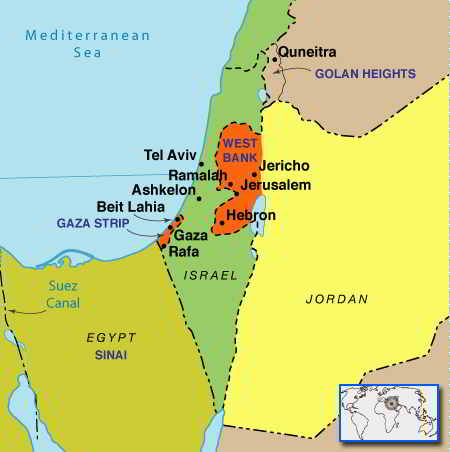[vc_row][vc_column][vc_column_text]In a controversial move, the Israeli Knesset goes ahead with legalising 4,000 West Bank settlement homes retroactively
By Sujit Bhar
When hubris piggy-backs a high dose of self-confidence, the yield is an attitude that refuses to see reality as it is, and even refuses to address situations within social and legal parameters of the world. One can be forgiven for thinking the simile is vis-à-vis US President Donald J Trump. You are correct in your assumption, in some ways, and wrong as well.
For, this is about Israeli Prime Minister Benjamin Netanyahu.
It was just the other day that the White House rebuked Israel for its decision to build more settlements in the West Bank. Yet on February 6, Israel’s Knesset passed a law that legalised—and retroactively too—no less than 4,000 settlement homes to be built on land that is privately held by Palestinians.
Which means that Netanyahu has not only thumbed his nose at the White House, but has also agreed to take on massive international outrage and an unending series of lawsuits in his stride.
On February 2, White House spokesman Sean Spicer had said in a statement: “While we don’t believe the existence of settlements is an impediment to peace, the construction of new settlements or the expansion of existing settlements beyond the current borders may not be helpful.”
“The Trump administration has not taken an official position on settlement activity and looks forward to continuing discussions, including with Prime Minister (Benjamin) Netanyahu when he visits with President Trump later this month,” Spicer had added.
While the statement surprised many, considering Trump’s pre-election position vis-a-vis Israel, the latter had made up its mind. Reacting to Spicer, Danny Danon, Israel’s ambassador to the UN, had put out a carefully worded reply. He told Israel Radio: “It’s too early to tell… I would not categorise this as a U-turn by the US administration but the issue is clearly on their agenda… the issue will be discussed when the prime minister (Netanyahu) meets the president in Washington. We will not always agree on everything.”
Back home, Israelis, it seems, refused to wait so long. One believes Netanyahu wants to hand Trump a fait accompli when they meet. That would be difficult for Trump to disengage from, given his original stand.
 On February 6, there as a debate in the Knesset, before voting on the Bill took place. In his reply, Israeli cabinet minister Ofir Akunis reportedly said: “We are voting tonight on our right to the land. We are voting tonight on the connection between the Jewish people and its land. This whole land is ours. All of it.”
On February 6, there as a debate in the Knesset, before voting on the Bill took place. In his reply, Israeli cabinet minister Ofir Akunis reportedly said: “We are voting tonight on our right to the land. We are voting tonight on the connection between the Jewish people and its land. This whole land is ours. All of it.”
Total disregard for law
This is clear hubris, a total disregard for international law and even a disregard for the UN Security Council’s December 23 resolution that demanded the stoppage of further settlement activity on occupied Palestinian territory. It was a vote taken in US abstention, but it remains a legal document nevertheless.
This act was, obviously, not worked out through negotiations. When it becomes as law—it is expected to be challenged in the Israeli Supreme Court—it will give the administration legal teeth to confiscate land and hand out whatever compensation the administration deems fit. Such compensation can be money or alternative land, which is surely not there.
The problem in the West Bank is that it is on the border and around disputed land. International laws regarding this have little possibility of being implemented in this area.
The land agreement worked out with international arbitration after Israeli victory in the six-day war of 1967, has neither been fully accepted by Israel nor ratified by the Palestinians. Hence the entire West Bank and even the Gaza Strip remains disputed.
However, with the Palestinian Authority being recognised worldwide today, the “compensation” package is probably just a face-saver. If a Palestinian landowner refuses to part with his land, he will be forced to. That is the ground reality.
The Twist in the Tale
Here lies a twist. The way Netanyahu has been acting it seems as if he has always been against risking the wrath of the world in resuming building on the West Bank. There was, reportedly, huge argument and shouting during the voting process before it was passed 60-52 in the 120-member Knesset.
It has been reported that some spectators in visitors’ seats had shown a black cloth in protest. It is also true that Netanyahu has been concerned about possible international censure and had wanted to wait till his meeting with Trump later this month. This, however, was a ploy to try and sensitize the US regarding the issue and brandishing this support while facing the world. To him, this would have given it a legitimate tinge, however weird that may be.
His dilly-dallying with the law was clear when he had told reporters in London that he was okay with the law going through, but withdrawing into a shell thereafter, probably because of Spicer’s statement.
Also read: Common ground for Trump, Netanyahu, Modi
Hark back to the Security Council decision where ex-president Barack Obama (he was still in office at that time) pushed this resolution through the 15-member council, comprising interesting countries: New Zealand, Malaysia, Venezuela and Senegal. Even Egypt, which had initially been interested, quietly withdrew under pressure from Israel and Trump.
Before that Trump had issued an unofficial call for a veto to the bill. Israel had supported it.
It is also pertinent to recall that Netanyahu was livid, calling the vote “shameful”. He had summoned US Ambassador Daniel Shapiro for a stern talk. Back with his cabinet, he had told his colleagues in the ministry that the resolution was “reckless and destructive”.
Hence his current ingenuous attitude fails to find takers.
There is, however, some dissent which seems justified. Netanyahu’s attorney general has said that the bill was unconstitutional and that he would not defend it in the Supreme Court. He has a point. He would probably be the one defending it if the case goes to the International Criminal Court at The Hague, Netherlands. That court has already been apprised of a lot of pertinent details and is said to be examining the settlements issue.
The reactions
The Palestinian reaction was as expected. Nabil Abu Rdeneh, a spokesman for Palestinian President Mahmoud Abbas, has said: “This is an escalation that would only lead to more instability and chaos. It is unacceptable. It is denounced and the international community should act immediately.”
The US State Department too has reacted cautiously. It has reportedly said: “The Trump administration will withhold comment on the legislation until the relevant court ruling.”
The move has not received support from the global Jewish advocacy group AJC. Its CEO David Harris has been quoted as saying: “Israel’s High Court can and should reverse this misguided legislation.”
International legal position
The Fourth Geneva Convention of 1949 prohibits countries from moving population into territories occupied in a war. That, incidentally, was also the year that the state of Israel came into existence.
The trouble has been with Israeli stubbornness and, of course, with massive US support. Israel says this decision of 1949 does not apply to territory occupied during the Six-Day War of 1967. Proving this argument to be specious, the UN Security Council, its General Assembly, the International Committee of the Red Cross, the International Court of Justice and the High Contracting Parties to the Convention have all said that the Fourth Geneva Convention does apply.
Technically that left Israel with the fig leaf of the US support.
Many UN resolutions have clearly said that these settlements, East Jerusalem and the Golan Heights occupations are illegal. The last UN Security Council decision wasn’t the first. Similar rulings had been passed in 1979 and 1980, too.
Israel has deliberately kept its position vis-a-vis the law somewhat vague and has failed to justify its stand about pushing its population into territory that the international community believes is Palestinian.
There has also been talk to equate this issue with the China-Tibet issue, but that has not gained as much traction as this. This is probably because of India’s somewhat weak position vis-a-vis the matter. It is the strength of conviction that keeps the Palestine issue hot around the world. The legal battles, that should ensue and then get lost in the mist, would still be pertinent in the social contexts of these nations.[/vc_column_text][/vc_column][/vc_row]


 India News23 hours ago
India News23 hours ago
 India News8 hours ago
India News8 hours ago
 India News8 hours ago
India News8 hours ago
 Latest world news8 hours ago
Latest world news8 hours ago
 India News2 hours ago
India News2 hours ago
 Cricket news2 hours ago
Cricket news2 hours ago
 Latest world news2 hours ago
Latest world news2 hours ago
















